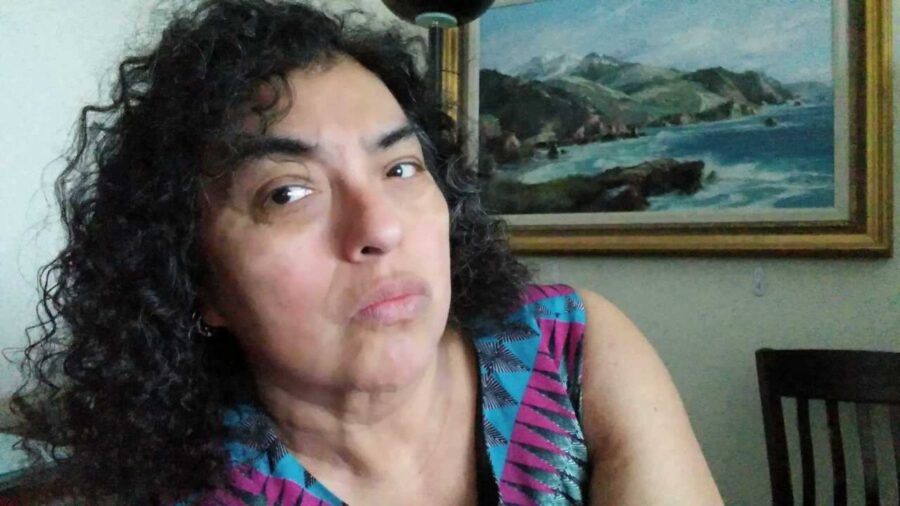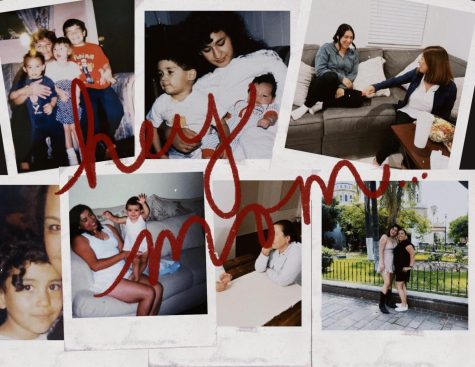Not Just Salt, but Pepper
A transgenders woman’ story
In a quiet suburban neighborhood in the hills of Diamond Bar lived a family of six. A loving mother and father raised four boys in an upper middle-class household. When the father and mother, an engineer and nurse, asked one of their sons, “What do you want to be when you grow up?” it wasn’t a lawyer, doctor, or politician. The answer was “a woman.”
Childhood
While in elementary school, Pepper Michaela Lopez remembers having admiration for girls. At this prepubescent age, she did not distinguish too much between genders, which made her attraction seem like no big deal. She just thought girls were cool and unique. However, once she hit junior high it was clear that who she wanted to be wasn’t going to happen, which in itself led to unhappiness. It was a confusing time for her and looking back at it now, she realized the normality of cisgender women knowing they are female because of their body parts. For transgender women, this is not the case.
“I would say, when did I know I was a woman? I think that’s one of the problems that transgender women have is questioning our validity as woman. I think when one is cisgender you never questioned that part of your identity. I’d say probably the real mark for me is having a vagina,” Lopez said.
She knew who she needed to be, but the accompanying insecurity of not having the right parts affected her for a long time. This changed after her 2017 Gender Confirmation Surgery, GCS. Before surgery, Lopez said she felt like less of a woman because cis women have the privilege of having the right body parts. While in junior high and high school, Pepper immersed herself in academics, all the while not knowing if she were gay or straight. In her teen years during the early 1980s, she was heterosexual and liked women and all social norms pointed toward liking women. This did not mean that she would want to be a woman. She had delayed puberty and it wasn’t until college that she had any real sexual feelings. Was she straight because of her assigned gender at birth and her attraction to women?
She managed to suppress her feelings and eventually married and had three children.
Marriage and Family
After the birth of her middle child in the 90s and at the age of 35, she came out to her spouse. Lopez decided to see a therapist and the advice given by the therapist was that she had an obligation to her marriage and family to not transition. This cost Lopez 15 years of delay from transitioning. As an experienced guidance counselor she had studied counseling and said that a therapist should not tell the patient what to do. During the 1990s the lack of information that the therapist had on trans folk led to a dead end response.
“Often therapists will go back to their comfort level so if they don’t know about trans folk they come back with other things like ‘you don’t have gender dysphoria you have ‘OCD’, so they almost look for what they’re comfortable with and that’s an unfortunate element of a therapist who is not trained well.”
Due to this ill-advised therapy, she took those feelings and put them away. She had a strong enough mind and willpower to leave those feelings behind but toward the end, when she saw a woman she would get jealous. She was conflicted about making a decision because she was in love with her spouse. With the idea of transitioning, came the cultural fear of being out as a trans woman. She was masculine, tall, and thought she would stand out in a crowd.
While going through a divorce, she did not tell her spouse that she was transitioning. When she helped her son move back in with her, she took her son and her ex-spouse by surprise. She emerged from the U-Haul wearing a skirt.
Her five children reacted differently when she told them her plans to transition. The first child, Rowan, her only daughter, said, “You’ll always be my father.” Son Ilias took the news poorly. He told her, “If you do that then I may never talk to you again.” Her eldest son Paris said, “It’s no big deal.” Son Keegan, who lived in Oregon, was told by phone.
“Those moments are all very genuine. I think you realize you inherently transition someone away from your children and you have to hear it. In my initial reaction I had to explain that it wasn’t a lie, but in the end the next couple months I had to acknowledge they had lost someone.”
She remembered what she calls the most humorous response coming from her youngest son Tristian, 8. While Lopez’s ex spouse was living in Oregon, Tristian would go back and forth seeing both parents. During her transition, she sent Tristian to Oregon as a man and when he came back, he saw his father as a woman. The first thing Tristian said to Lopez was, “I liked you better the other way.” He wanted her to put her men’s clothes back on.
Lopez had to find a way to explain what gender dysphoria was so she took him to a local restaurant, Señor Baja, where there were salt and pepper shakers on the table. She explained to him that cisgender people have their mind and body lined up, putting the salt and pepper shakers on top of each other. Lopez explained that these people feel completely fine, but when you’re transgendered, they don’t line up. There’s an impossible tension between the mind and body, and it isn’t until you change your body that you feel harmony.
So she put the salt shakers down and he said, “I think I get it. Before you were like the salt, everything was the same and white. Now you’re like the pepper, white and dark.”
This moment is when she picked the name Pepper.
When Lopez told her parents, her mother forbid her to go through with transitioning. Lopez’s response to her mother was that she was not asking for her permission, but telling them out of courtesy so that the next time she showed up with nail polish and a dress, they would know why. Her father simply said, “You’re wasting your intelligence.”
The Transition
In 2011, Lopez was studying college counseling and student development. This was the first time that she experienced the opportunity to talk about diversity and student support. It was unusual for her to hear people talking about LGBT folks and being supportive. There came a point when she realized that she couldn’t support students if she were a hypocrite, so she knew she had to transition. In November of that year, she spoke to the Los Angeles Gay and Lesbian Center about taking hormones. She started a new job in December and began taking hormones and waited for the transition to take effect. Through Obamacare, she was eligible for medical insurance and pushed for Gender Reassignment surgery, genital, and breast augmentation. She was 50.
“I think people were surprised with how quickly I did it. I had been keeping it bottled up for 15 years so it wasn’t a surprise for me. I had put it off in the end for my marriage, but I didn’t need to do that anymore.
Credentials of a Man vs. Woman
Her father’s response that she was wasting her intelligence signifies the way women are treated in our culture. Lopez said that there are stark differences between how she was treated as a male than how she was treated as a female in the workforce. She remembered a moment at her job when she was counting to 25, making stacks of paper, and putting paper clips on them. She was being paid $12,000 less a year as a woman.
“I think my father’s comment was about that. That this level of intelligence is respected in a man and dismissed in a woman.”
While at Azusa Pacific University, a Christian college, it was tough to transition because of their biased view on the LGBT community. Lopez recalled a professor named Adam Akley who was terminated for being transgender. During this time, Lopez was a graduate student.
Lopez remembered another issue when was helping her son Paris move back to Los Angeles from Oregon. They needed to stop for gas. While Paris pumped gas at a the station, Lopez used the restroom. She noticed a woman with a child who was offended that Lopez was using the women’s restroom. The woman became upset and insisted that there was a man in the stall and demanded by banging on the door that Lopez get out. The cashier came in and Lopez explained through the other side of the locked door that she was a transgender woman using the restroom and she would be out shortly. This did not stop them from banging on the door.
“I’m a bit cocky so when I came out, I lectured them both that I deserved the same respect as any woman and they had no business pounding on the door like that.”
Lopez explained to the cashier, who had never had a transgender person, that transgender women would typically use the women’s restroom and transgender males would use male restrooms. As Lopez was walking back to the U-Haul, truck the woman who caused the confrontation had worked up her boyfriend to the point that he tried to run over Lopez.
“I’m still pretty fast and jumped in-between the pumps. When he missed, he brought the car into a halt and jumped out and said he was going to cut my throat.”
Paris stood by her side and asked what was going on. The man told Paris it was none of his business. Paris, a stocky male, responded that it was his business which resulted in the the man leaving. Lopez was so traumatized that she developed Post Traumatic Stress Disorder PTSD and and began having panic attacks on the freeway.
“I would be looking on the freeway and would think people were going to jump out of their car and attack me by trying to break into my car. This does not happen at 65 to 70 mph, but when you have something spastic like PTSD, your brain doesn’t filter the certain possibilities.”
Reading articles about LGBT folks suffering from PTSD helped her manage her stress.

LGBT Community
Lopez had a hard time finding the right support because she said she doesn’t fit in at the transgender group meetings. Lopez said the groups would dwell on being broken while she wanted to talk about advocacy and ideology. She was, however, able to find the right therapists to help her.
Her parents eventually came around and became somewhat of a support group within her family. Her mother at times doesn’t get the pronouns right, but her father has adapted. Her children are supportive despite their initial reaction. Lopez said it’s because she was always the cool parent so it would be hard for them to not like her.
Lopez said that trans folk, in her perspective, aren’t trying to evoke any difference from the norm, but rather are trying to disappear into normality.
“In defining the term transgender, I’ll first I’ll go back to the LGBT. Now they have Q,I,A and at this point it’s ridiculous. You put so many letters on this thing that it means nothing so you might as well put an H on it for heterosexual and include everyone.
Lopez added that most trans folks are dealing with sexual orientation issues and often trans issues are lumped into this.
“Sexual orientation is who you go to bed with. Gender identity is not who you sleep with, but who you go to bed as. Why does transgender become a sexual issue? You’re transgender going to the bathroom, taking a shower, and gardening.”
There are a few places that Lopez feels that heterosexuals are more comfortable than at a patriarchal homosexual LGBT center. She explained that when it comes to transgender society, it almost seems to be more of a society of misfits. Lopez said there needs to be advocacy to debunk the gender binary that there are more than just men and women. Lopez sums up transgender folks as having a medical condition.
“Ours is a medical issue and the primary advocacy is changing the posture of insurance companies and having them treat our medical condition like they do everyone else. Rather than saying, you have a fetish issue, we don’t have to do anything. So I think this is a problem — grouping of the umbrella of people who are so dissimilar when gender dysphoria is a medical condition.”
Lopez said it is confusing to folks who are not transgender to bunch them up together. The first thing they think of is drag queens, but to her that is a part of gay men culture. Drag is more of a lifestyle choice.
“There needs to be clarity about gender dysphoria. In dating people, they think I am a transgender porn star, which is disgusting because I’m like, ‘where are you getting this from?’”

How she feels now
The analogy she gives is that she feels like a cake. She has a good carrot cake and she can eat it without frosting, but she could continue to make the cream cheese frosting. She has undergone surgery with her breast, genitals, and face. Her goals are no different than any other cisgender woman.
“I suppose I am just one of those transgender women that just wants to disappear in culture and not be bothered.”








